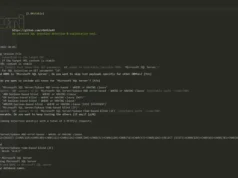SQLx is an async, pure Rust† SQL crate featuring compile-time checked queries without a DSL.
- Truly Asynchronous. Built from the ground-up using async/await for maximum concurrency.
- Compile-time checked queries (if you want). See SQLx is not an ORM.
- Database Agnostic. Support for PostgreSQL, MySQL, MariaDB, SQLite.
- MSSQL was supported prior to version 0.7, but has been removed pending a full rewrite of the driver as part of our SQLx Pro initiative.
- Pure Rust. The Postgres and MySQL/MariaDB drivers are written in pure Rust using zero unsafe†† code.
- Runtime Agnostic. Works on different runtimes (
async-std/tokio/actix) and TLS backends (native-tls,rustls).
† The SQLite driver uses the libsqlite3 C library as SQLite is an embedded database (the only way we could be pure Rust for SQLite is by porting all of SQLite to Rust).
†† SQLx uses #![forbid(unsafe_code)] unless the sqlite feature is enabled. The SQLite driver directly invokes the SQLite3 API via libsqlite3-sys, which requires unsafe.
- Cross-platform. Being native Rust, SQLx will compile anywhere Rust is supported.
- Built-in connection pooling with
sqlx::Pool. - Row streaming. Data is read asynchronously from the database and decoded on demand.
- Automatic statement preparation and caching. When using the high-level query API (
sqlx::query), statements are prepared and cached per connection. - Simple (unprepared) query execution including fetching results into the same
Rowtypes used by the high-level API. Supports batch execution and returns results from all statements. - Transport Layer Security (TLS) where supported (MySQL, MariaDB and PostgreSQL).
- Asynchronous notifications using
LISTENandNOTIFYfor PostgreSQL. - Nested transactions with support for save points.
Anydatabase driver for changing the database driver at runtime. AnAnyPoolconnects to the driver indicated by the URL scheme.
Install
SQLx is compatible with the async-std, tokio, and actix runtimes; and, the native-tls and rustls TLS backends. When adding the dependency, you must choose a runtime feature that is runtime + tls.
# Cargo.toml
[dependencies]
# PICK ONE OF THE FOLLOWING:
# tokio (no TLS)
sqlx = { version = "0.8", features = [ "runtime-tokio" ] }
# tokio + native-tls
sqlx = { version = "0.8", features = [ "runtime-tokio", "tls-native-tls" ] }
# tokio + rustls with ring and WebPKI CA certificates
sqlx = { version = "0.8", features = [ "runtime-tokio", "tls-rustls-ring-webpki" ] }
# tokio + rustls with ring and platform's native CA certificates
sqlx = { version = "0.8", features = [ "runtime-tokio", "tls-rustls-ring-native-roots" ] }
# tokio + rustls with aws-lc-rs
sqlx = { version = "0.8", features = [ "runtime-tokio", "tls-rustls-aws-lc-rs" ] }
# async-std (no TLS)
sqlx = { version = "0.8", features = [ "runtime-async-std" ] }
# async-std + native-tls
sqlx = { version = "0.8", features = [ "runtime-async-std", "tls-native-tls" ] }
# async-std + rustls with ring and WebPKI CA certificates
sqlx = { version = "0.8", features = [ "runtime-async-std", "tls-rustls-ring-webpki" ] }
# async-std + rustls with ring and platform's native CA certificates
sqlx = { version = "0.8", features = [ "runtime-async-std", "tls-rustls-ring-native-roots" ] }
# async-std + rustls with aws-lc-rs
sqlx = { version = "0.8", features = [ "runtime-async-std", "tls-rustls-aws-lc-rs" ] }For more information click here.















